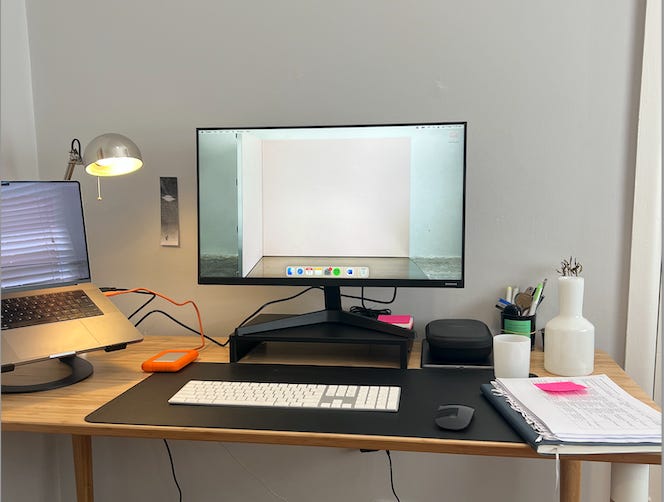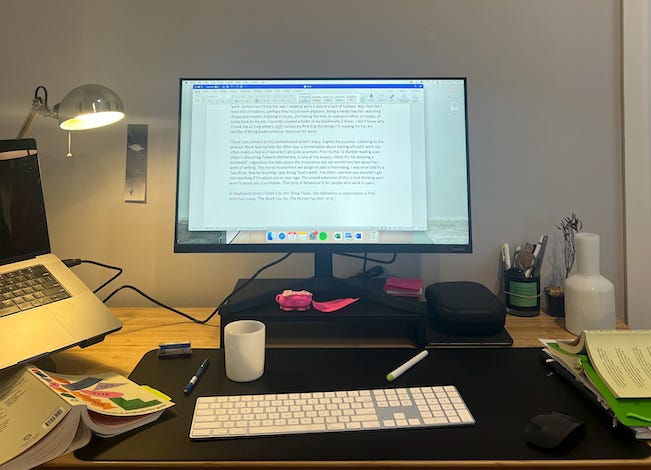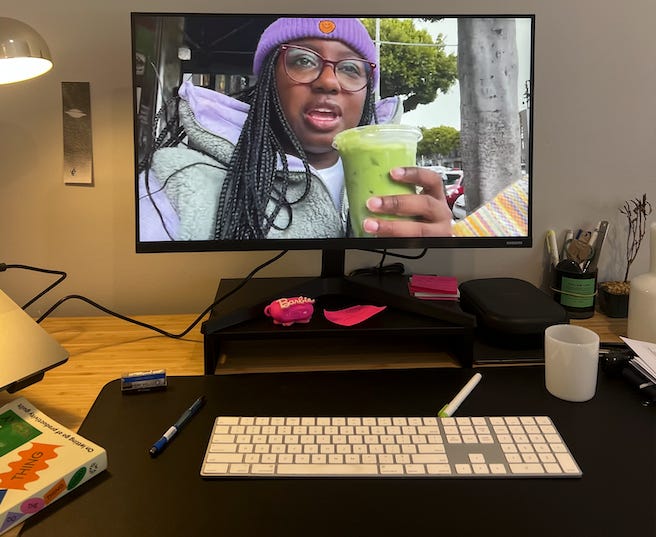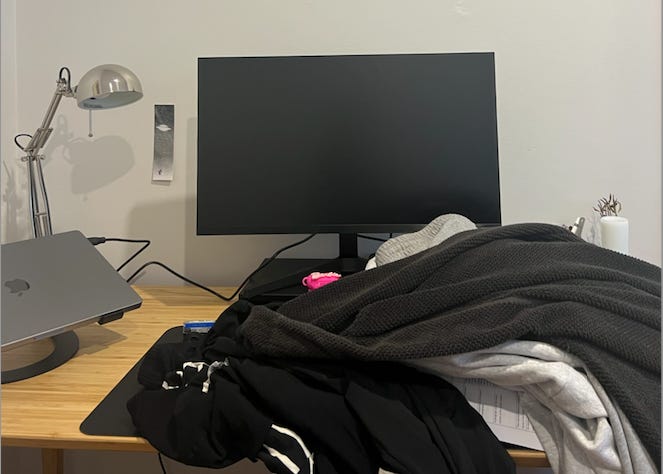The Workspace
Reflecting on our connection to work, representations of working women and influences which shape our attitudes to work.
No matter how quiet you think you’re being in the night, you never are. The sonic trigger of a computer powering up feels too loud for the space. Naturally you hit your knee but manage to only drop one book in a bid to save that stack that are cascading towards the floor. The monitor seems far too bright, but you’re unbothered by effects of the blue light, because the thoughts of the tasks that have pulled you back out of bed are enough to keep you awake anyway.
In this instance, the inability to sleep made me feel as if it was the night before Christmas, but instead of the promise of presents, a breakfast of Coco Pops and lots of lasagne, I had the guarantee of more work. Work which would be added to the already teetering pile.
Earlier that day, I’d created a to-do list. The list was an amalgamation of the thoughts in my head, the scrawl in the margin of my diary and the post-it notes I had stuck to my laptop. Every time I remember something, or another person mentions an errand to me, I peel a neon pink square off the bent pile and write so quickly, that later I’ll have to spend time deciphering whatever it was, that I had to write it down then and there, with such haste. This year, I told myself I would only write in one type of pen in my diary, so every time there is an urge to write something down in my giant blue planner, I rifle through one of the many spaces I keep one of these pens. It’s akin to people keeping lip balms and hand creams everywhere.
I spend lots of time thinking about my work and my workspace. I reflect on my relationship with work, how I am perceived at work, and how others view my relationship with work. To be good at my job, and a hard worker are important to me. As is being involved with my work. Sometimes I think the way I relate to work is due to a lack of hobbies. But I feel like I have lots of hobbies, perhaps they’re just work adjacent. Being a media teacher, watching shows and movies, listening to music, and taking the time to read and reflect on books, all come back to my job. I recently created a folder in my bookmarks (I know, I don’t know why it took me so long either), and I constantly find that the things I’m reading for fun are worthy of being bookmarked as resources for work.
There’s an element to this enmeshment which I enjoy. It gives me purpose. Listening to the podcast Work Appropriate the other day, a conversation about leaving altruistic work can often make us feel as if we aren’t altruistic anymore. Prior to this I’d started reading Joan Didion’s Slouching Towards Bethlehem, in one of the essays, I think it’s ‘On Keeping a Notebook’, regardless she talks about the irrelevance she can sometimes feel about her work of writing. The moral involvement we assign to jobs is interesting. I was once told by a Taxi driver that by teaching I was doing God’s work. I’ve often said that you shouldn’t get into teaching if it’s about your ego. The unsaid extension of this is that thinking your work is about you is a mistake. That kind of behaviour is for people who work in Sales.
In Madeleine Dore’s I Didn’t Do the Thing Today, she references a conversation a Toni Morrison essay, ‘The Work You Do, The Person You Are’. In it, Morrison was speaking to her father about the expectations of her job. The advice he gave was, ‘Listen, you don’t live there. You live here. With your people. Go to work. Get your money. And come on home.’ The essay goes on to suggest we should work for ourselves and not our bosses, and the work we do does not define who we are. This isn’t to get into a tired conversation about people asking you ‘What do you do?’ when you first meet them.
In the same chapter of Dore’s book, she references the Harvard Study of Adult Development which suggests that ‘Good relationships keep us happier and healthier. Period.’ In my work, building relationships with students is at the forefront. It’s hard not to slip into work speak when I talk about this. But the idea that the work of teaching must highly be intertwined with the creation of relationships, which then can be switched off when we leave is one which confuses me. Perhaps this has to do with a lack of boundaries. I’m not sure.
Looking back at my personal context, I can see the beginning of my attitude towards work shaping. I can also see what kind of work was given value through conversations that were had at home. I’d say both my sisters and I saw the way it was always Mum home if we were sick and how her work is in a care industry. Dad’s work was ever present. Mainly due to his lack of presence. I have learnt good habits, and bad from seeing how they work.
Being in teaching, I am in a field dominated by women. On a good day, I think this is great regardless. On a not so good day, I feel that we have been drawn to a role which expects us to remain attuned to the needs of others for us to do our work well. Hence the discussion about relationships, above.
A gendered approach to work is one which is mirrored in our media. The a-sexual or masculine career woman is often seen as cold and lonely. Whereas the working man, just hasn’t found the right woman yet. In some instances, the working woman is punished by divorce for her choices. As was the case in the Devil Wears Prada, Miranda Priestly, depicted by Meryl Streep is left by her husband. The unsaid reasoning is that she devotes too much time to the magazine. No woman can have it all, you see, if she is successful at work, her home life must be a mess. If she manages those two things, then she is probably very ugly or has no friends. Or both. In the same film, Andy decides that she doesn’t want to go down the path of being ambitious in the fashion world, as that will undoubtedly lead her to being a bitch and single forever. In one of my least favourite movies of all time, The Intern, Anne Hathaway’s character Jules is cheated on by her husband. The cause of which seems to be her working too much. I am aware I am talking about the depiction of heterosexual relationships here. Other dynamics aren’t represented at all. A huge problem.
There are some positive representations of women at work in the media such as, Jean in Sex Education, Elle Woods in Legally Blonde and Syd Shaw in Brown Sugar. All do their own thing and manage to experience happiness along the way. These are not complete in their representation but allude to a strong sense of self that is lacking in a lot of texts.
Adding to this view I have of work is my obsession surrounding content which focuses on the behaviour of people who are successful at work, and the workspaces which people create for themselves. My favourite videos are ones in which people set up, clean or organise their desks. The relationship I have with my workspace is highly dependent on how I am feeling about work. If I am into what I am doing, the desk itself becomes irrelevant, but often to get the work done, the desk and the space it is in ‘must’ be a certain way for me to get started.
Teaching is not a job that lends itself to hybrid work situations. Due to this, I have two workspaces, the one I have been given at work, and the one I have set up at home. Both see me do work for my job and work for this newsletter. To set myself up in either place seems to require several things, power cords, changing internet proxies, mice and keyboards, the laptop the stand, the lists I previously mentioned. Then to teach I cart all these things around with me, ensuring I have a pencil case with bits of tat, a water bottle and any of the other ridiculous things I get asked for. They are not crucial to doing the work but are a part of the job. The classroom I teach in most of the time also has cabinets full of anything we (the students or myself) may need. Some of these items are more crucial like cameras for filming. The work itself is then dependant on the space. And the space needs to be able to cater for the work.
Much has been written about the boundaryless work situation created by technology. The technology is not seamless, often dealing with server issues or low batteries due to overuse (and shit batteries). The work and more likely, the technology which it is on has become the priority. You cannot simply reply to emails whilst cooking yourself dinner but stop cooking dinner to reply to emails. Likewise, we stop doing our jobs at work to reply to a friend or watch a TikTok. Technology has allowed us to create an identity out of how we work. LinkedIn, Instagram, TikTok all contain content that shows we are great at our jobs, forever learning in our jobs, or allow us to make fun of our jobs and the culture of work. We have also allowed one device to become the portal for all the facets of our lives.
The constant desire to be on is linked to our accessibility to work, and work’s accessibility to us. It’s also linked to our choice to be ‘on’ thanks to our technology use and to the opportunity that we have as a society to commodify all elements of our lives, whether we are getting financially renumerated or exchanging social capital. Also, sometimes it’s just more fun to be on the internet than dealing with whatever it is in front of us. It’s socially acceptable to be in two places at once, or physically present somewhere, whilst mentally available somewhere else.
I wish I had some poetic ending to tie up these thoughts on work and the culture of work. I see my friends and family at different stages of their careers. I am infuriated by the lack of support, in awe of what they are building and empathise with my students when they bemoan the fact that school doesn’t teach them how to do their taxes. I am in the thick of it, and the kind of day I’ve had at work, my energy levels and how capable I am feeling have all fed into this piece which has taken a while to write, so I thank you for reading. Naturally all these things influence how I feel about work, the importance it has in my life and how I see my role in it, as well as the role it has in my life.
If you are interested in reading about work in society, or you like me, find yourself drawn to books surrounding work and productivity here is a list of things you may enjoy or find helpful. Please share any recommendations in the comments.
· I Didn’t Do The Thing Today – Madeleine Dore
· Out Of Office – Charlie Warzel and Anne Helen Petersen
· Can’t Even: How Millennials Became the Burnout Generation - Anne Helen Petersen
· How Do We Know We’re Doing it Right? – Pandora Sykes
· New Money: How Payment Became Social Media – Lana Swartz
· An Ordinary Age: Finding Your Way in a World That Expects Exceptional – Rainseford Stauffer
· The New Me – Halle Butler
· Joy At Work – Marie Kondo and Scott Sonenshein
· The Working Woman’s Handbook – Phoebe Lovatt
· Work Ethics – Phoebe Lovatt
· The following HBR Guides: Work-Life Balance, Beating Burnout, Getting The Right Work Done, Managing Stress at Work, Being More Productive, Women at Work and
· Little Black Book – Otegha Uwagba
· The New Garconne – Navaz Baltiwalla
· Getting Things Done – David Allen
· Grace Beverley’s YouTube Channel
· Hannah Elise Room Organisation
· The Hyphen newsletter by Emma Gannon
The images in today’s newsletter are various stages of my desk at home during work, and breaks from work, and just the general mess that accumulates.





